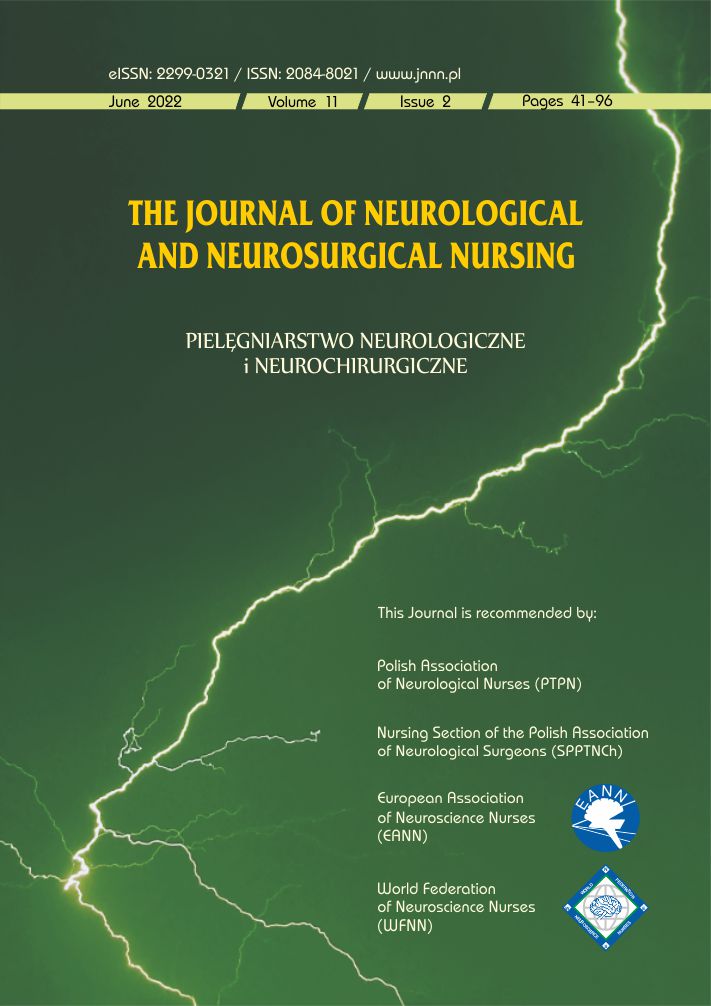Strategie radzenia sobie ze stresem wśród personelu medycznego na sali operacyjnej
DOI:
https://doi.org/10.15225/PNN.2022.11.2.3Słowa kluczowe
strategie radzenia sobie ze stresem, stres, osobowość typ DAbstrakt
Wstęp. Stres jest nieustanie obecny w pracy pracowników ochrony zdrowia, którzy każdego dnia mają kontakt z ludźmi chorymi i cierpiącymi. Personel medyczny musi posiadać zarówno fachową wiedzę, umiejętności jak i kompetencje społeczne, aby jak najlepiej pomagać pacjentom. Różne mogą być strategie radzenia sobie ze stresem wśród pracowników medycznych. Jednym z czynników, który może mieć wpływ na wybierane strategie jest osobowość. Osobowość typu D łączy cechy negatywnej emocjonalności i hamowania społecznego. Ten typ osobowości predysponuje do odczuwania zwiększonego nasilenia stresu.
Cel. Celem pracy było określenie poziomu stresu oraz strategii radzenia sobie ze stresem wśród pracowników bloku operacyjnego.
Materiał i metody. Przebadano 100 pracowników bloku operacyjnego. Badaną grupą stanowili pielęgniarki/pielęgniarze, ratownicy medyczni, lekarze. W badaniach wykorzystano kwestionariusze: Skalę Odczuwanego Stresu (PSS-10), Inwentarz do Pomiaru Radzenia Sobie ze Stresem (Mini-COPE), Skalę do pomiaru typu D (DS-14) oraz ankietę własną.
Wyniki. Niemal połowa badanych (47%) wykazuje wysoki poziom stresu a u 35 badanych (35%) stwierdzono średni poziom stresu. Najczęściej stosowanymi strategiami radzenia sobie ze stresem były: aktywne radzenie sobie, planowanie, pozytywne przewartościowanie, akceptacja i poszukiwanie wsparcia emocjonalnego. 41% respondentów wykazało osobowość typu D. Negatywna emocjonalność była mocniej zaznaczona niż hamowanie społeczne.
Wnioski. Najwyższy poziom stresu odczuwają głównie młode kobiety, nie będące w związku, o krótkim stażu pracy. Należałoby wprowadzić systemowe wsparcie psychologiczne szczególnie ukierunkowane na tę grupę. Z uwagi na niedobory kadrowe pracowników medycznych należy również wdrożyć działania zapobiegające wypaleniu zawodowemu. Możliwym rozwiązaniem mogłyby być zajęcia czy szkolenia jeszcze przed podjęciem pracy. Ich celem byłoby przygotowanie do stresujących momentów w przyszłej pracy i nauczenie najefektywniejszych sposobów radzenia sobie ze stresem. (PNN 2022;11(2):59–64).
Bibliografia
Chmiel N., Stres a zdrowie pracowników. W: Chmiel N. (Red.), Psychologia pracy i organizacji. GWP, Gdańsk 2002;173 za: Kraczla M. Wypalenie zawodowe jako efekt długotrwałego stresu. Zeszyty Naukowe Wyższej Szkoły Humanitas. Zarządzanie. 2013;2:69–81.
Harasim K. Stres w zawodach wysokiego ryzyka. Humanum. Międzynarodowe Studia Społeczno-Humanistyczne. 2018;1(28):43–66.
Kraczla M. Wypalenie zawodowe jako efekt długotrwałego stresu. Zeszyty Naukowe Wyższej Szkoły Humanitas. Zarządzanie. 2013;2:69–81.
Skoczek M., Kuberski M., Biskupek-Wanot A. Stres zawodowy. W: Biskupek-Wanot A., Wanot B., Kasprowska-Nowak K. (Red.), Aktywność fizyczna i problematyka stresu. Uniwersytet Humanistyczno-Przyrodniczy im. Jana Długosza w Częstochowie, Częstochowa 2020;94–104.
Heszen-Niejodek I. Stres i radzenie sobie — główne kontrowersje. W: Heszen-Niejodek I., Ratajczak Z. (Red.), Człowiek w sytuacji stresu. Problemy teoretyczne i metodologiczne. Wydawnictwo Uniwersytetu Śląskiego, Katowice 2000;12–43.
Makowska H., Poprawa R. Radzenie sobie ze stresem w procesie budowania zdrowia. W: Dolińska-Zygmunt G. (Red.), Podstawy psychologii zdrowia. Uniwersytet Wrocławski, Wrocław 2001;71–102.
Gładysz G., Kobos E., Czarnecka J., Imiela J. Zachowania żywieniowe pielęgniarek w środowisku pracy. Pielęg Pol. 2016;2(60):149–157.
Kwak M., Zaczyk I., Wilczek-Rużyczka E. Stres i style radzenia sobie z nim przez polskie pielęgniarki — metaanaliza badań. Med Og Nauk Zdr. 2018;24(2):120–125.
Ogińska-Bulik N. Rola strategii radzenia sobie ze stresem w rozwoju po traumie u ratowników medycznych. Med Pr. 2014;65(2):209–217.
Stychno E., Kulczycka K., Kosicka B., Ksykiewicz-Dorota A. Osobowość stresowa a satysfakcja z życia pielęgniarek. Przeds Zarz. 2014;15(12):45–57.
Kim Y.H., Kim S.R., Kim Y.O., Kim J.Y., Kim H.K., Kim H.Y. Influence of type D personality on job stress and job satisfaction in clinical nurses: the mediating effects of compassion fatigue, burnout, and compassion satisfaction. J Adv Nurs. 2017;73(4):905–916.
Pobrania
Opublikowane
Jak cytować
Numer
Dział
Licencja

Utwór dostępny jest na licencji Creative Commons Uznanie autorstwa – Bez utworów zależnych 4.0 Międzynarodowe.
Statystyki
Liczba wyświetleń i pobrań: 2804
Liczba cytowań: 0
